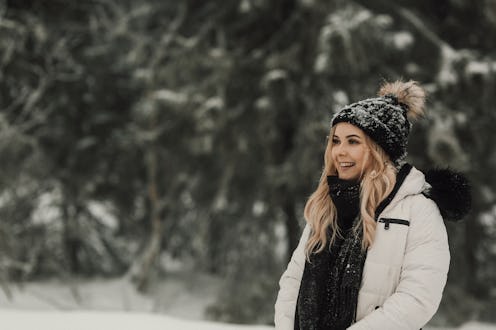Life
7 Weird Things Your Body Does When It's Cold

I'm a born-and-raised New England girl, which surprises just about everyone when they find out, because despite my decades of conditioning, I still absolutely hate cold weather. It takes 20 minutes just to get the appropriate layers on to go outside, you have to carry tissues with you wherever you go because your nose will inevitably get runny, and there are plenty of other weird things your body does when it's cold out that makes frigid weather that much more unlikable. I don't know about you, but I'd much rather be sunning myself on a beach than shoveling my way out of a snowbank any day.
If you live in a place that experiences the seasons, then you already know some of the effects different weather has on the body. In the fall, your sleep pattern can change, you can get exhausted from the heat in the summer, and the spring brings with it red eyes and scratchy throats. But the winter? Now that's a whole other beast entirely, and when the cold weather sets in, your body starts to do some strange things.
Fall is long behind us, and spring is still months away, so get ready for these seven weird things your body does when it's cold, because it's going to be happening a lot now. Happy winter.
1. Your blood flow reduces
One of your body's first lines of defense against the cold is reduced blood flow. When your body is confronted with cold air or cold water, your blood vessels constrict, limiting the amount of blood that flows to the skin's surface and redirecting it internally. What does this mean for your body? Your hands and feet will start to feel colder than the rest of you, but that's actually a good thing — it means that your body is losing less heat from your skin's surface, and instead is being conserved to protect your vital organs. No one likes frozen fingers, but you'd probably like hypothermia a whole lot less.
2. You start to shiver
If your restricted blood flow isn't enough, your body has another way of keeping warm: shivering. If your temperature falls too low, your body will try and generate its own heat through shivering. The muscles and organs will shake to help produce heat your body can't get elsewhere, and the colder you get, the more intense the shivering will get. Not a fan of uncontrollable shaking? Try stamping your feet, clapping, or jumping around. Moving on your own creates the same type of heat producing effect that shivering does.
3. You get goosebumps
Goosebumps can happen for a variety of reasons, from watching a scary movie to fooling around with your partner, but probably the most common reason for goosebumps is cold weather. According to the Smithsonian, goosebumps have been a part of humans' defense against the cold for a long time, since our ancestors had long body hair. When you get cold, the hair on your skin sticks up in an attempt to create a fluffy insulating layer, but since that long hair is now gone, all we see is the muscles around our now short hair follicles contract. I never thought I'd say this, but now I think it would be nice to have some bushy arm hair — at least for the winter.
4. Your nipples get hard
Similar to the process of getting goosebumps, cold weather can also make your nipples get hard. The small muscles around the hair follicles on your nipples contract in the cold, which makes the nipples themselves protrude outward. Another reason for "beaming" in the cold is that the areola — the colored area around the nipples, for those who missed health class — is one of the most sensitive and easily stimulated parts of the body, so when they get cold, their muscles also contract, which in turn makes the nipple stick outward. No one likes beaming, but hey, it happens to everyone.
5. You feel tired and lazy
We've all been there: it's hovering just below freezing outside, and suddenly, the only thing you can do is sit on the couch and binge watch your favorite TV show. No, you're not lame, it's the weather's fault. When the cold weather sets in, it is usually accompanied by fewer hours of sunlight, and that change can actually affect your sleep cycle and create what some people call "winter tiredness." Because of the shorter days and reduced sunlight, your body produces more melatonin, which is a hormone that makes you feel sleepy. So the next time you want to go to bed at 6:30 p.m., don't blame yourself, blame it on the weather.
6. Men's scrotums shrink
As it turns out, George Costanza wasn't lying when he blames his small package on the cold temperatures in the pool. In cold weather, a man's scrotum will change its size and get smaller to help protect the testicles and maintain the right internal temperature required to produce sperm. It might not be the best look, but it's certainly necessary.
7. You can go temporarily blind
When cold temperatures reach a critical level, our bodies have different ways of warning us. When hypothermia becomes dangerous, the blood vessels in your eyes join the constricting party in order to conserve energy, which can lead to temporary blindness. I don't know about you, but that sounds absolutely terrifying.
For more facts about the health and the body, check out Bustle on YouTube.
Image: Johner Images/Johner Images Royalty-Free/Getty Images; Giphy (7)